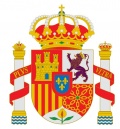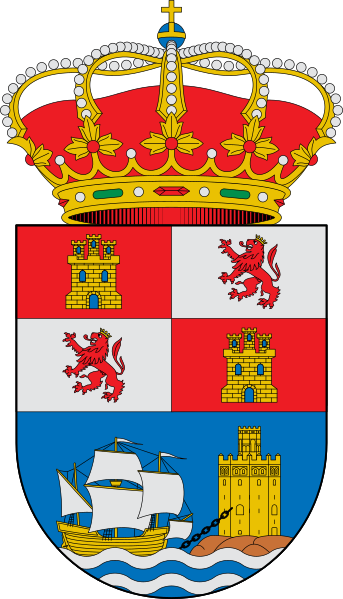Santoña: Difference between revisions
Knorrepoes (talk | contribs) m (Text replacement - "{| class="wikitable" |+Official blazon |- |'''Spanish''' | ===Origin/meaning===" to "{| class="wikitable" |+Official blazon |- |'''Spanish''' | |- |'''English''' | {{blazon wanted}} |} ===Origin/meaning===") |
Knorrepoes (talk | contribs) No edit summary |
||
| Line 22: | Line 22: | ||
The lower part of the shield refers to other very important episode in the history of Spain. During the medieval ages the Christian kingdom of Spain was located only in the Northern region of Spain, and the rest was dominated by the Moors. The Cantabrian fleet, was ordered by the king of Spain to break the chains that the muslims had placed crossing the river Guadalquivir (in Seville) and that fleet broke them and conquered Seville. The victorious fleet was composed by the four main villages of Cantabria, including Santoña and since that date the arms show a figure of a ship breaking a chain, which is firmly bound to the famous Torre del Oro (Golden tower), one of the symbols of Seville. This same picture of the ship is also included in the arms of the other villages that participated in the conquest of Seville, [[Laredo (Cantabria)|Laredo]], [[Santander]], and [[San Vicente de la Barquera]]. | The lower part of the shield refers to other very important episode in the history of Spain. During the medieval ages the Christian kingdom of Spain was located only in the Northern region of Spain, and the rest was dominated by the Moors. The Cantabrian fleet, was ordered by the king of Spain to break the chains that the muslims had placed crossing the river Guadalquivir (in Seville) and that fleet broke them and conquered Seville. The victorious fleet was composed by the four main villages of Cantabria, including Santoña and since that date the arms show a figure of a ship breaking a chain, which is firmly bound to the famous Torre del Oro (Golden tower), one of the symbols of Seville. This same picture of the ship is also included in the arms of the other villages that participated in the conquest of Seville, [[Laredo (Cantabria)|Laredo]], [[Santander]], and [[San Vicente de la Barquera]]. | ||
[[Literature]] : Image from Wikipedia | |||
{{media}} | |||
[[Category:Spanish Municipalities S]] | [[Category:Spanish Municipalities S]] | ||
[[Category:Cantabria]] | [[Category:Cantabria]] | ||
Revision as of 05:01, 9 September 2022
Spanish heraldry portal
This page is part of the Spanish heraldry portal |
Heraldry of the World |
|
Civic heraldry:
|
Other heraldry: |
SANTOÑA
Region : Comunidad Autónoma de Cantabria (until 1982 Province of Santander)
| Spanish | |
| English | No blazon/translation known. Please click here to send your (heraldic !) blazon or translation |
Origin/meaning
The upper half of the arms shows the combined arms of the two Kingdoms Castille (castle) and Leon (lion). These arms were adopted by the city, as one of the ships of Columbus, the Santa Maria, was owned by Juan de la Cosa from Santoña. Columbus was send on his voyage by the King of Castille-Leon.
The lower part of the shield refers to other very important episode in the history of Spain. During the medieval ages the Christian kingdom of Spain was located only in the Northern region of Spain, and the rest was dominated by the Moors. The Cantabrian fleet, was ordered by the king of Spain to break the chains that the muslims had placed crossing the river Guadalquivir (in Seville) and that fleet broke them and conquered Seville. The victorious fleet was composed by the four main villages of Cantabria, including Santoña and since that date the arms show a figure of a ship breaking a chain, which is firmly bound to the famous Torre del Oro (Golden tower), one of the symbols of Seville. This same picture of the ship is also included in the arms of the other villages that participated in the conquest of Seville, Laredo, Santander, and San Vicente de la Barquera.
Literature : Image from Wikipedia
Contact and Support
Partners:
Your logo here ?
Contact us
© since 1995, Heraldry of the World, Ralf Hartemink 
Index of the site












